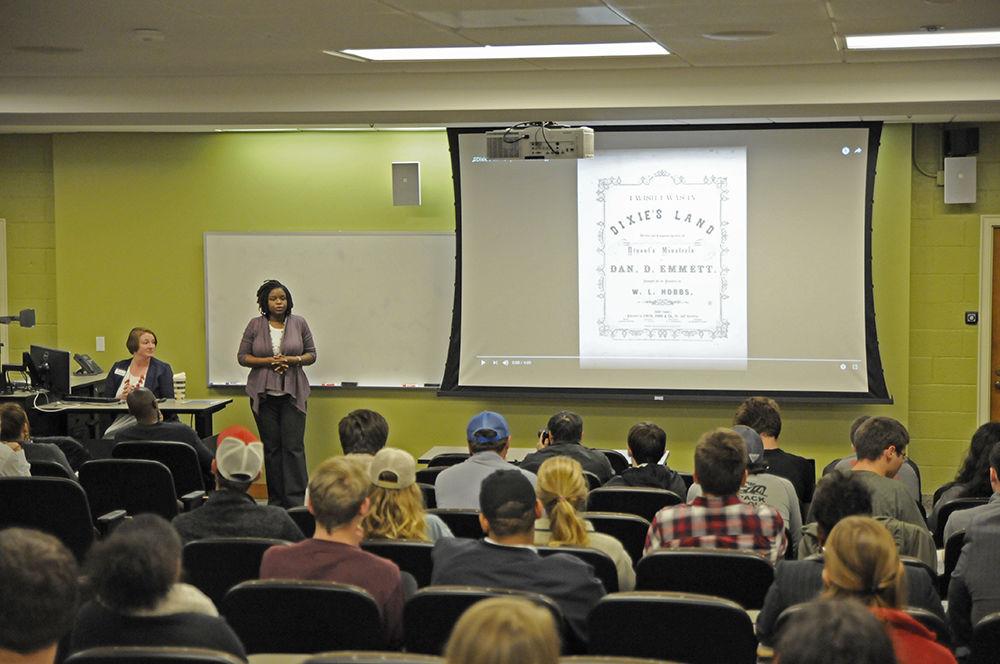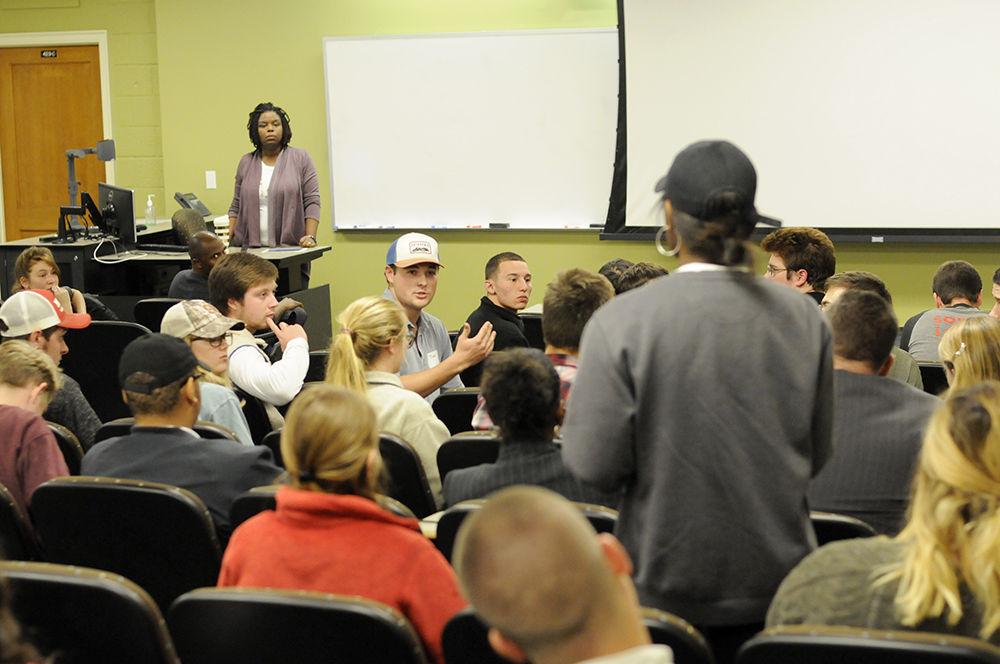On Tuesday* evening the IMPACT Leadership Village led** a Village Perspectives event in Daniels Hall titled “‘Dixie’ in the NC State Alma Mater: A dialogue about our history and our present” that led** students to voice their opinions and openly debate the racial implications of the word ‘Dixie’ in the NC State alma mater. The event drew a crowd of approximately 54 students and key NC State administrators from DASA.
The event featured a history lesson on the evolution of the word ‘Dixie’ from the practice of minstrelsy, a form of racially charged entertainment developed in the early 19th century, according to Blair Kelley, associate professor of history. This led to an open discussion about students’ feelings and ideas surrounding the word Dixie.
“I was trying to be of service in the conversation [Anna Patton, Director of the IMPACT Leadership Village and lead organizer of the event] was trying to have …,” Kelley said. “She invited me and I was attracted to it because it was historical and I’m a historian, and I love working on the history of minstrelsy.”
Kelley described how the practice of minstrelsy was extremely popular in the United States leading up to the Civil War. The word ‘Dixie’ entered the American vernacular when the song “Dixie”, a song that originated from minstrel shows, became popular across the United States in the 1850s, according to Kelley. Kelley also offered other possible origins for the word, including the the Mason-Dixon line, named after Jeremiah Dixon, or a currency used in New Orleans called the Dix.
“I worked on segregation in my first book, which was called ‘Right to Ride,’ so that’s when I did my research into minstrelsy and origins of the term ‘Jim Crow,’” Kelley said.
Students from various backgrounds and living and learning villages were present for the discussion that lasted for an hour and a half. Alexis Riddick, a second-year studying English and communication and a member of the IMPACT Leadership village who was involved in planning the event, said she thought the conversation was productive overall, but believed some people in attendance did not understand the event’s purpose.
“I thought it was great, but towards the end it got a little skewed,” Riddick said. “I think some people misunderstood what this conversation was supposed to be about. A lot of people came here with accusations against Jackie and against [IMPACT Leadership Village] trying to get rid of the word ‘Dixie’ and other Confederate symbols.”
Other students, like Michael Hoxie, a fourth-year studying human biology, thought that the conversation was ineffective due to how the event was structured. Hoxie was concerned with how the event was influenced by the talk given by Kelley in the beginning of the event.
“I think overall it was pretty unproductive,” Hoxie said. “I would say the first half-hour was her just lecturing, which I don’t necessarily have a problem with, except this was advertised as a discussion and a debate on the word ‘Dixie.’ This was never advertised as a lecture or a history lesson.”
Following the event while answering questions for students one-on-one, Kelley spoke with Technician about how she thought the discussion went overall.
“I’m sorry that some of the students thought that I was brought here to race bait or divide the room,” Kelley said. “It’s not my [alma mater], it’s not my fight. I’m a faculty member, there are very few occasions where I’m around when it’s sung.”
Students who did not see the word ‘Dixie’ as having largely negative connotations believed it was a neutral reference to the south, regardless of the history of the word. This point of view was explained by Hoxie, who took the word ‘Dixie’ quite literally.
“Look it up on dictionary.com, it literally means southern states, the South,” Hoxie said. “I’ve grown up in North Carolina my whole life and I’ve seen the Mason-Dixon line, … everything below it is the southern states and everything above it is the northern states.”
Jackie Gonzalez, student body president and a fourth-year studying political science, was present at the event. On Oct. 31 Gonzalez wrote an op-ed for Technician titled “OP-ED: Dixie,” arguing that there are racial implications associated with the word ‘Dixie’ and expressing interest in creating a dialogue on the topic.
Many students in attendance at the event believed the event was created in response to the OP-ED by Gonzalez. According to Riddick, the event has been in the works since mid-August when the idea was conceived of at convocation following a talk by Rupert Nacoste, an NC State professor of psychology.
“This is not a conversation that is new to NC State and the student body,” Gonzalez said. “This is a conversation that was had by my immediate predecessor, predecessor before him, the predecessor before him, and on and on. … sorry if it was misconstrued to be that way.”
The event did not go unnoticed by university officials, like Mike Mullen, vice chancellor and dean for the Department of Academic and Student Affairs, and Justine Hollingshead, the chief of staff for DASA, who were both present and attentive, but silent at the event.
“That is not a decision I have any control over,” Mullen said. “It would probably be a very complex conversation, with alumni and a variety of other constituents.”
This was the first of many Living and Learning Village Perspectives events that will occur throughout the year, and students are excited to participate in more.
*Editor’s note: This article was updated on Nov. 15 with the date of the event.
*Editor’s note: This article was updated on Nov. 15 with correct spelling.
John FereBee, a first-year student studying management discusses the differences between views with fellow student Alexis Riddick, a second-year student studying English in Daniels Hall during a discussion about the use of the word "Dixie" in the N.C. State alma mater song. Arguments were made on both the sides of removing the word from the alma mater due to its glorification of the confederate south, and for keeping it in the alma mater as to not be omitting or destroying history.









